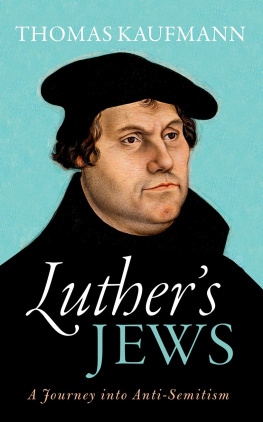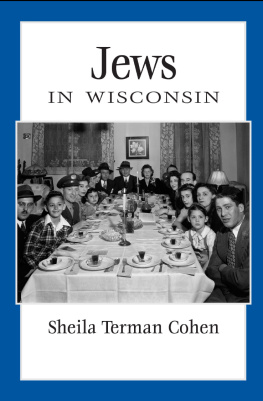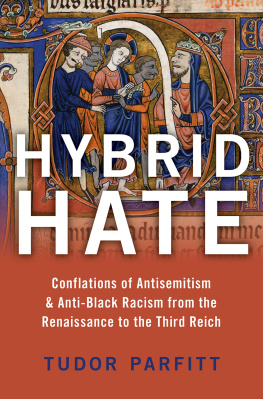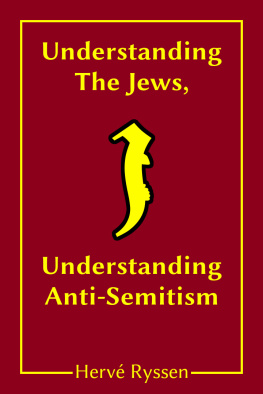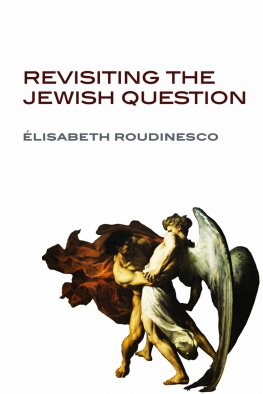Kaufmann Thomas - Luthers Jews: A Journey into Anti-Semitism
Here you can read online Kaufmann Thomas - Luthers Jews: A Journey into Anti-Semitism full text of the book (entire story) in english for free. Download pdf and epub, get meaning, cover and reviews about this ebook. year: 2016, publisher: Oxford University Press, Incorporated, genre: Religion. Description of the work, (preface) as well as reviews are available. Best literature library LitArk.com created for fans of good reading and offers a wide selection of genres:
Romance novel
Science fiction
Adventure
Detective
Science
History
Home and family
Prose
Art
Politics
Computer
Non-fiction
Religion
Business
Children
Humor
Choose a favorite category and find really read worthwhile books. Enjoy immersion in the world of imagination, feel the emotions of the characters or learn something new for yourself, make an fascinating discovery.
- Book:Luthers Jews: A Journey into Anti-Semitism
- Author:
- Publisher:Oxford University Press, Incorporated
- Genre:
- Year:2016
- Rating:5 / 5
- Favourites:Add to favourites
- Your mark:
- 100
- 1
- 2
- 3
- 4
- 5
Luthers Jews: A Journey into Anti-Semitism: summary, description and annotation
We offer to read an annotation, description, summary or preface (depends on what the author of the book "Luthers Jews: A Journey into Anti-Semitism" wrote himself). If you haven't found the necessary information about the book — write in the comments, we will try to find it.
Luthers Jews: A Journey into Anti-Semitism — read online for free the complete book (whole text) full work
Below is the text of the book, divided by pages. System saving the place of the last page read, allows you to conveniently read the book "Luthers Jews: A Journey into Anti-Semitism" online for free, without having to search again every time where you left off. Put a bookmark, and you can go to the page where you finished reading at any time.
Font size:
Interval:
Bookmark:


Great Clarendon Street, Oxford, ox2 6DP, United Kingdom
Oxford University Press is a department of the University of Oxford. It furthers the Universitys objective of excellence in research, scholarship, and education by publishing worldwide. Oxford is a registered trade mark of Oxford University Press in the UK and in certain other countries
Thomas Kaufmann 2017
Originally published in Germany as Luthers Juden 2014 Philipp Reclam jun. GmbH & Co. KG
The moral rights of the author have been asserted
First Edition published in 2017
Impression: 1
All rights reserved. No part of this publication may be reproduced, stored in a retrieval system, or transmitted, in any form or by any means, without the prior permission in writing of Oxford University Press, or as expressly permitted by law, by licence or under terms agreed with the appropriate reprographics rights organization. Enquiries concerning reproduction outside the scope of the above should be sent to the Rights Department, Oxford University Press, at the address above
You must not circulate this work in any other form and you must impose this same condition on any acquirer
Published in the United States of America by Oxford University Press 198 Madison Avenue, New York, NY 10016, United States of America
British Library Cataloguing in Publication Data
Data available
Library of Congress Control Number: 2016942735
ISBN 9780198738541
ebook ISBN 9780191058448
Printed in Great Britain by Clays Ltd, St Ives plc
Links to third party websites are provided by Oxford in good faith and for information only. Oxford disclaims any responsibility for the materials contained in any third party website referenced in this work.
The translation of this work was funded by Geisteswissenschaften International Translation Funding for Humanities and Social Sciences from Germany, a joint initiative from Germany, a joint initiative of the Fritz Thyssen Foundation, the German Federal Foreign Office, the collecting society VG WORT and the Brsenverein des Deutschen Buchhandels (German Publishers & Booksellers Association).
On 28 January 1546, on a journey to Eisleben, his birthplace, Martin Luther suffered a heart attack. The journey was to be his last; three weeks later, on 18 February, he died. His description of this unpleasant and frightening event in a letter to his beloved wife Kthe four days later contained a curious explanation, no doubt intended to reassure his wife, who had already been anxious when he set off:
I felt my strength leave me just outside Eisleben. It was my own fault. But if youd been there you would have said it was the fault of the Jews or of their God. For just outside Eisleben we had to go through a village where a lot of Jews live and perhaps it was they who blew on me so hard. Eisleben is a place with more than fifty Jews and there is no doubt that as I passed through the village I felt such a cold wind blow through the carriage onto my head, through my cap, that it seemed as if my brain would turn to ice. Thats probably what made me feel dizzy.
The symptoms as described by Luther, a seriously overweight 63-year-old, point to one explanation in modern medical language: a narrowing of the coronary blood vessels. Probably as a result of walking some distance alongside the coach at the start of which lies the village of Rissdorf, nowadays Niederrissdorf, just outside Eisleben, is notorious for its biting east winds. These features of climate and topography may well have been responsible for Luthers particularly intense experience of life-threatening cold. Today the point on the Luther trail named Cold Place is a reminder of this event, albeit the topography is not entirely accurate.
In the days that followed Luther did not take things easy. He was engaged in efforts that were ultimately successful to mediate in a quarrel between the Counts of Mansfeld and bring about a settlement. Equitable solutions to inheritance disputes were being sought; issues of sovereignty also involved rulings on church organization. From the start, however, Luther had a wider agenda: As soon as the main issues are settled I have to get on with expelling the Jews [], he wrote to Kthe in the letter quoted above of 1 February 1546. Thus the great reformer, this man who had long since become an iconic figure, who was both regarded with awe by his followers and assailed by enemies and opponents, had one final earthly care as he returned to Eisleben, where his life had begun, namely the expulsion of a few dozen Jews from Mansfeld. Thanks to the protection of the Dowager Countess Dorothea von Mansfeld-Vorderort the Jews had found refuge there when they were forced to leave the bishopric of Merseburg. Among the places where Luther spent a significant length of time, Eisleben was the only one in which Jews were tolerated during his lifetime. His attempts to expel them from there too were to succeed after his death.
In the last sermons Luther preached in the church of St Andrew in Eisleben shortly before his death he expounded the distinctiveness of faith in Christ, contrasting it to the religion of the Jews, Turks, and Papists. Christians must be conscious that they can neither eradicate nor fight against the opponents of the true faith. The Church, he said, would go on being under siege and in need of forgiveness; it had to live with difference. At the conclusion to his final sermon in Eisleben, preached on 14 or 15 February, he added a Warning Against the Jews,
Luthers last public statement, which appeared in print after his death, was an emphatic warning to Christian society against being implicated in Jewish sin. Jews in his view contaminated a Christian community by their evil ways, which in addition to blasphemous practices included perverse economic and other activities. All their energies were aimed at destroying Christians and this must inevitably bring down Gods wrath upon them. Conversion or expulsion: there was no other option because the Jews were so dangerous: they were poisoners; they were sorcerers in league with the Devil, their God, and had been out to kill Luther himself for years; they were idolaters and blasphemers whom God would crush. Luthers wife shared his fear of the Jews. He also assumed his listeners would concur with him and, as far as we know, this Wittenberg theology professor did not in fact put them off with his anti-Jewish vitriol. Even Count Albrecht VII of Mansfeld-Hinterort was compliant; from 1547 Luthers homeland was free of Jews.
The reformers hatred of the Jews incorporated features that cannot simply be labelled theological or religious and go beyond the traditional Christian hostility to the Jews that can already be seen in the New Testament. Luthers reference to the quality of Jewish blood and to extortion and usury, his claim that Jews committed murder by poisoning and similar accusations were fed from the various murky channels of a specifically pre-modern anti-Semitism, in other words from a hostility resting on the belief that this species of humanity shared a specific nature.
Luther took pre-modern anti-Semitism for granted, adopted it, and helped to spread it. In the light of the expectations that people considered themselves justified in placing upon Luther as a theologian, religious communicator, profound biblical exegete, and German professor, and in view of the authority he acquired as hero of the Reformation and father of the Protestant Church, his contempt for the Jews, which was unchecked by theological rigour, has serious implications. In our times it casts a deep shadow over his personality and his achievements. The fact that in the early days of the Reformation Luther, by virtue of his book
Font size:
Interval:
Bookmark:
Similar books «Luthers Jews: A Journey into Anti-Semitism»
Look at similar books to Luthers Jews: A Journey into Anti-Semitism. We have selected literature similar in name and meaning in the hope of providing readers with more options to find new, interesting, not yet read works.
Discussion, reviews of the book Luthers Jews: A Journey into Anti-Semitism and just readers' own opinions. Leave your comments, write what you think about the work, its meaning or the main characters. Specify what exactly you liked and what you didn't like, and why you think so.

